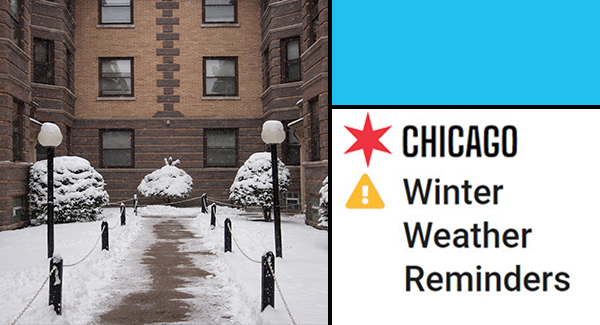The City of Chicago Department of Buildings has issued winter weather reminders impacting landlords and rental property managers. You can find the reminders below and here.
Chicago Heat Ordinance
Residences
The Heat Ordinance requires that during designated cold weather months landlords supply heat to residential apartments where occupants do not have individual control of the heat (individual heating equipment). The Heat Ordinance also requires that landlords keep heating equipment within individual apartments or homes in good operating condition. Tenants may be required to pay the associated utility bills.
Workspaces
The Heat Ordinance also requires that during designated cold weather months building owners provide heat to indoor workspaces. There are exceptions for workspaces where cold temperatures are necessary for the type of work being performed, such as a refrigerated warehouse.
Penalties
Landlords and building owners face fines of up to $1,000 per day, per violation, for each day they do not supply adequate heat. The reason for lack of heat does not matter—building owners must follow the law, and heat must be provided.
Reporting Violations
If you are a resident or worker in the City of Chicago and your landlord or employer is not providing adequate heat or no heat at all, you may file a complaint using 3‑1‑1. The Department of Buildings will inspect and take action against delinquent landlords and employers.
To report a condition that poses an immediate danger to yourself or others, always call 9‑1‑1.
For more information, please visit Chicago.gov/heat.
Winter Weather Reminders for Building Owners
Winter weather can cause ice to form on buildings, overhead structures like utility lines, and outdoor walking surfaces. Continued cold temperatures with periods of slight warming increase the chance that ice will form. Building owners are responsible for monitoring any potential hazard when their building starts to accumulate snow or ice. Building owners can take the following steps to reduce the risk of injuries caused by snow and ice:
- Building owners are required to clear snow and ice from public sidewalks adjoining their property.
- Building owners are required to ensure that exit doors and exterior stairs that are part of a required exit path (such as porches in multi-family buildings) are kept clear of snow, ice, and other obstructions.
- Building owners should clear ice and snow from other walking surfaces on private property, such as in parking lots.
- Building owners should post warning signs in areas where pedestrians are likely to be present when they are aware that ice has accumulated on a building or overhead structure, or ice is likely to accumulate because of the weather forecast. These signs help to remind pedestrians to be aware of their surroundings.
In the long term, buildings should have a regular maintenance plan to ensure building features, such as roofs, gutters, and downspouts are working as intended and are not blocked before winter weather arrives. In spring, building owners should evaluate their buildings to identify and repair any damage caused by winter weather.
Avoid Frozen Pipes
Prevent pipes from freezing by:
- Maintaining proper heat in your home.
- Making sure that there is warm air circulating in any area where there are water pipes. This includes garages and unheated areas of your home. Where pipes are inside of cabinets, prop open cabinet doors.
- Insulating pipes, particularly those outside or on the perimeter of the house.
- Removing all garden hoses from hose bibs and cover the bibs with Styrofoam insulating caps.
If pipes do freeze, do not use candles or any open flame to thaw them. Try a hair dryer or heating pad instead.
For tips on when to trickle water to avoid frozen pipes, view this short video from the Department of Water Management.
Legal Resource
Questions about the security deposits, evictions, leases, tenant screening, and other landlord legal issues? Our experienced landlord/tenant attorneys are here to help.
Call KSN toll-free at 855-537-0500 or visit www.ksnlaw.com.
Please note the material contained in this article is for educational and informational purposes only and does not constitute legal advice. No attorney-client relationship is established by your review or receipt of the information contained in this article. You should not act on the information discussed in this article without first obtaining legal advice from an attorney duly licensed to practice law in your State. While KSN has made every effort to include up-to-date information in this article, the law can change quickly. Accordingly, please understand that information discussed in this article may not yet reflect the most recent legal developments. Material is not guaranteed to be correct, complete, or up to date. KSN reserves the right to revise or update the information and statements of law discussed in the article law at any time, without notice, and disclaims any liability for your use of information or statements of law discussed on the article, or the accessibility of the article generally. This article may be considered advertising in some jurisdictions under applicable law/s and/or ethical rules/regulations. © 2024 Kovitz Shifrin Nesbit, A Professional Corporation.

